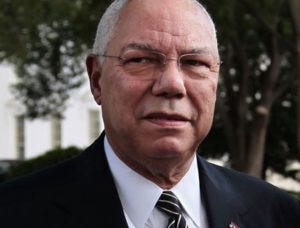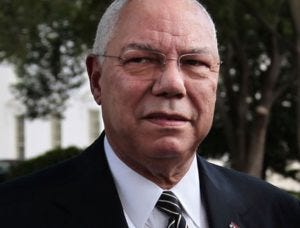I was disappointed back in 2008 when retired four-star general, Colin Powell, endorsed Barack Obama for president. It wasn't so much the fact that Powell had broken party ranks that bothered me. After all, if someone feels strongly that the other party's candidate would make a better leader of the free world, they should speak up and make their voice heard.
I was let down because I didn't believe for one second that Powell truly considered Obama to be a better man for the job than John McCain.
With Powell's extensive foreign policy and military background, it's tough to subscribe to the idea that he envisioned an inexperienced junior senator from Illinois (who often spoke recklessly and confusedly on such topics) as a more competent Commander-in-Chief than a former military commander with abundant foreign policy expertise (perhaps unparalleled in the U.S. Senate). It's also hard to figure out how Powell could view a man, who had a history of surrounding himself with individuals harboring deep, anti-American sentiment, as a better representative of our country's interests than a war hero who had sacrificed everything for his nation.
I'm no mind-reader of course, but I felt it was quite telling that Powell never made much of a case for Obama being the better choice, other than hailing his "intellectual curiosity" and "intellectual vigor." Instead, Powell made it clear from the onset that he had problems with the GOP.
Few doubted that, but most believed his beef stemmed from internal strife within the Bush administration, and regrets Powell had in relaying bad Iraq intelligence to the United Nations. He downplayed that as the reason, and instead said that he was bothered by the divisive language used in Republican circles — specifically the portrayal of Obama as a Muslim.
Some right-wingers did indeed do this (and still do). What struck me at the time, however, was that McCain himself had been publicly and repeatedly rejecting the narrative (even denouncing his supporters in the process) — something that Powell seemed unwilling to acknowledge.
McCain, of course, was not a divisive figure. With a long history of reaching across the political aisle, he ran an honorable campaign and demonstrated strong character — many believe to his detriment. While he was largely staying above the political fray, the Obama camp was demonstrating an eagerness to get down in the mud and play dirty, like when they ran Spanish-language television ads that portraying McCain as a racist.
For whatever reason, this didn't faze Powell. Neither did the hateful rhetoric that had been pouring out of the Democratic base for years, including the routine charge that Powell himself was guilty of war crimes.
Whatever the extent of the grudge Powell had with the GOP, he took it out on their party's nominee. His support was very helpful to Obama, and it was again in 2012, when he offered up another presidential endorsement.
Powell has since sharpened his criticism of what he calls "a dark vein of intolerance" in the Republican party, and his stature has made him an effective messenger of that theme (despite his arguments lacking substance).
Needless to say, the Democrats owe Powell — big time.
How have they repaid him? By using him as a scapegoat for Hillary Clinton's corruption.
From the moment that news of Clinton's private email server went public, scores of prominent Democrats (including Clinton herself) have emphatically insisted that her actions were no different than those of Colin Powell, when he was the Secretary of State.
We've heard that same face-saving excuse time after time, and the claim is utterly false. They've known this all along.
When Powell was in office, he occasionally used a personal email account to conduct non-intel, government business. Clinton, on the other hand, set up a secret email server that was totally unsecured and outside of the scope of the U.S. government. She used it for all of her State Department email communications, including the storage of information that was of the highest possible level of classified material.
Comparing the two is like comparing a lit match to a forest fire.
Still, Clinton and her party have parroted this lame narrative ad nauseam, and they've done so at the expense of Powell's record.
But it's worse than that. On Friday, we found out from a New York Times report that Clinton wasn't content with merely drawing a self-serving, false equivalency between the two. She took things a step further, and actually told the FBI that it was Powell who advised her to conduct her State Department business on a personal account.
Powell, who had been largely silent on the Clinton email scandal, seems to have finally had enough. While stating that he once described his own use of personal email to Clinton, he rejected the assertion that he, in any way, influenced what she did.
"Her people have been trying to pin it on me," he candidly told People Magazine on Saturday. "The truth is, she was using [the private email server] for a year before I sent her a memo telling her what I did."
When asked why Clinton had pointed the finger at him, Powell answered, "Why do you think?"
Powell went on to say that he's not bothered by the accusation, since he's in the free, but for someone whose public record is clearly important to him, one would have to doubt the sincerity of that statement. The fact that he said as much as he did, in public, speaks volumes.
For whatever internal conflicts Powell had with his colleagues in the Bush administration, and however he felt his legacy was stained with his role in the Iraq War, the truth of the matter is that Powell retired from public service with the universal respect of the Republican party.
Republicans sang his praises and saluted him at a time when the anti-war left was calling him a "liar," saying he had "blood on his hands," and demanding that he be tried for war crimes.
Even today, after he's taken some pretty brutal shots at the party's base, you'd be hard-pressed to find Republican leaders speaking ill of him.
It's a shame that the party he's now aligned with doesn't share in that respect. To them, he's become little more than a political shield for Democratic corruption — a prop for their presidential nominee to toss aside once his usefulness has expired.
It's not a fate befitting of an American patriot.





